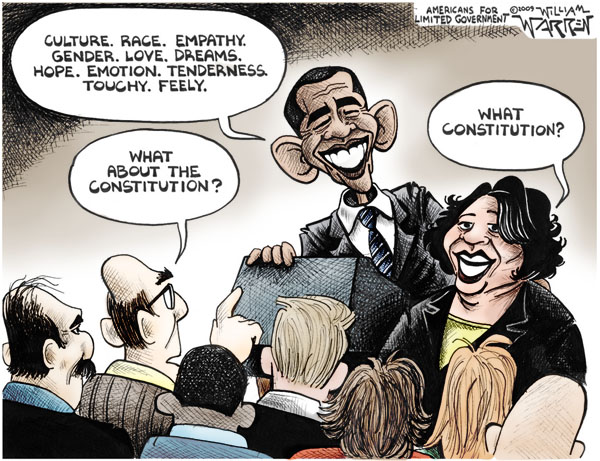What the 2010 Elections Mean
October 18, 2010Contrarian 1 Comment »With midterm elections two weeks away and pollsters predicting that Republicans — many with Tea Party backing — will gain control of the House and perhaps pick up as many as 12 seats in the Senate, the challengers’ campaigns seem to be coalescing around two principal themes: substantially reducing the size of the federal government, and repealing Obamacare.
Democrats and their cheeleaders in the media have been loudly demanding that these GOP budget-cutters spell out in detail which federal programs they would dismantle should they be elected. They are betting, of course, that most of the insurgents’ Tea Party supporters are either syncophants parroting platitudes whose implications they don’t understand, or hypocrites who may be eager to snatch away someone else’s free lunch but will never willingly surrender their own. “Lay your program out on the table, TP panderers,” say the Dems, “and see how many votes it costs ya.”
Now, these calls might seem like nothing more than pleas for honesty and candor. And, to be sure, the GOP won a Congressional majority in 1994 by making many of the same the same promises, which soon proved to be hollow.
The Tea Party candidates would be well advised, however, not to dwell on the specific cuts they would make if elected. That would transform the elections into referenda on particular programs, when most of their supporters view this election as a broad referendum on the role of the federal government in the life of the Republic. Even Obamacare is merely a symptom of the problem, not its cause.
If that is indeed the objective, then the correct strategy for the campaign is not to delve into an item-by-item cost-benefit analysis of the present federal budget, but to articulate the principles for determining which activities are within the purview of federal power and which are not. With clear criteria in hand we can then eliminate the programs those criteria reject, however beloved some of them may be to various interest groups.
Fortunately, we have a criterion with a solid historical pedigree, namely, the Constitution. It enumerates a variety of tasks to be entrusted to the federal government, and reserves all other governmental powers to the States, which are in turn constrained by their own constitutions. Unfortunately, those limits on federal power were virtually extinguished in the 1930s when the Supreme Court, under the gun of FDR’s court-packing threat, re-wrote a few innocuous Constitutional phrases, sufficiently expanding their scope to accommodate Roosevelt’s agenda. Of course, due to the doctrine of stare decisis, one expansion easily led to the next, until the Constitution’s limits on federal power were effectively abolished.
The effects are easily seen in the growth of government over the last century, and especially since the mid-30s. In 1900 American governments at all levels consumed less than 7% of GDP, a fraction that held for over 100 years. They now consume 45%, with no upper limit in sight, because there is nothing structural left to check it. Federal debt now stands at $13.7 trillion and will increase to $19.6 trillion by 2015 (and will likely be much more if Obamacare is not repealed or struck down by the courts).
Needless to say, champions of unlimited federal power refuse to acknowledge that any such fundamental controversy exists, and will decline to engage in any such debate. They’ll claim that the relevant constitutional law is “settled,” and that only factor voters should consider is how the unspecified cuts promised by the Tea Party candidates might affect them. They are encouraging voters to vote their short-term self-interest.
In fact, however, the proper construal of the interstate commerce, “general welfare,” and “public use” clauses of the Constitution are by no means settled, any more than the doctrine of “separate but equal” was settled with the Court’s decision in Plessy v. Ferguson. While some constitutional scholars have defended the Court’s New Deal readings of those clauses, they have lost the debate. The historical evidence is abundant and affords no support for their positions. Straws for the apologists to grasp are becoming increasingly hard to come by. (On this question readers may wish to peruse this, this, or this).
But let’s be clear about one thing: there are only two ways to eliminate the federal debt — by raising taxes well above their levels prior to the Bush cuts (which would reduce the projected deficit by 2019 by only $2 trillion) or by reducing spending. Not even most Democrats will go along with imposing the huge tax hikes which would be required in an economy as crippled as this one. So, something has gotta go.
The new Congress can either choose those cuts via vote counting and reciprocal back-scratching (their usual method), or by taking a principled approach. The relevant principle is the Constitution, not as the Supreme Court has mangled it in recent decades, but as its framers and the American people understood it when they wrote and ratified it.
But be advised, Republicans. You cannot pull another 1994. The folks who elected you did not hire you to pay mere lip service to smaller government, nor to defend their favorite free lunches and cut someone else’s, nor yet to engage in horse trading with the statists, but to change the course of American history — to return it from the sidetrack onto which it was diverted in the ’30s, which they can now see leads to a precipice. You need to understand your mandate and then let the knife fall where it may. If you fail to follow through your new political careers will be short indeed.
Tags: court rulings, Democracy, individual freedom



Posted on October 19th, 2010 at 8:39 pm
Thanks for good stuff